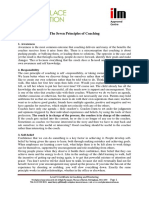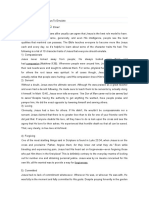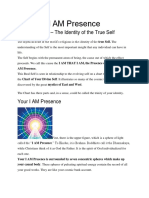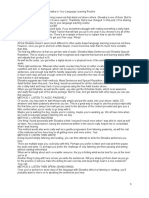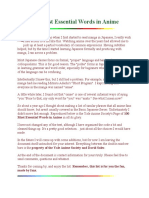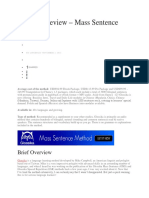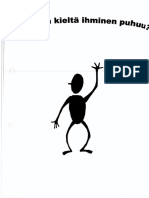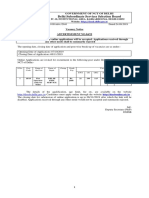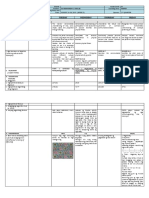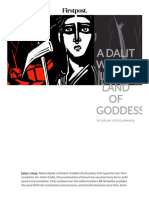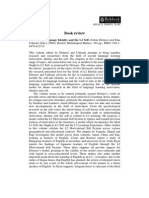A List of Interjections in English
A List of Interjections in English
Uploaded by
parajms8778Copyright:
Available Formats
A List of Interjections in English
A List of Interjections in English
Uploaded by
parajms8778Copyright
Available Formats
Share this document
Did you find this document useful?
Is this content inappropriate?
Copyright:
Available Formats
A List of Interjections in English
A List of Interjections in English
Uploaded by
parajms8778Copyright:
Available Formats
A List of Interjections in English
Holy Cow! 101 English Interjections and Exclamations
Jacquie Boyd/Getty Images
Updated September 07, 2019
"Ow!" "Ack!" "Yikes!" No doubt, anyone familiar with comic books is well versed in these pithy little
utterances. Interjections (or, as they're sometimes—somewhat misleadingly—called, exclamations) are
words or short phrases that stand apart from the rest of a sentence grammatically or appear on their own
without a subject and verb. Interjections may also be holophrases. Because they're often used to exclaim,
interjections often pack an emotional punch that can make fictional dialogue more realistic.
Key Takeaways: Interjections
Interjections are short phrases often used to exclaim.
They can stand on their own as sentences.
Interjections are the "outlaws of English grammar" as illustrated in this writer's other interjections piece:
"Interjections usually stand apart from normal sentences, defiantly maintaining their syntactic independence.
(Yeah!) They aren't marked inflectionally for grammatical categories such as tense or number. (No sirree!)
And because they show up more frequently in spoken English than in writing, most scholars have chosen to
ignore them. (Aw.)"
101 Interjections
As you read through this list, see if you can pick out the interjections that have more than one meaning or
can be used in more than one way. Additional spellings or usages are listed in parentheses.
1. Ah: Ah, I don't know if that's true.
2. Aha: Aha! I figured it out!
3. Ahem: Ahem, could you boys stop talking so we could get on with class, please?
4. Alas: Alas, it was not to be.
5. Amen: Amen, hallelujah, amen!
6. Aw: Aw, do we have to?
7. Awesome: You two are dating? Awesome!
8. Aww: Aww, that's so cute!
9. Bada-bing (bada-bing, bada-bing, bada-boom): "You've gotta get up close like this and—bada-
BING!—you blow their brains all over your nice Ivy League suit." (From "The Godfather," 1972)
10. Bah: Bah, humbug!
11. Baloney: Oh, baloney. I don't believe that.
12. Big deal: Big deal. Who cares?
13. Bingo: Bingo! Right on target!
14. Boo: Boo! Scared you!
15. Boo-hoo: That makes me sad. Boo-hoo.
16. Booyah (boo-yah): Yeah, I aced this test. Booyah!
17. Boy (boy oh boy): Oh boy. Oh boy, oh boy. That's heavy, man.
18. Bravo: Bravo! That was fantastic!
19. Brilliant: Brilliant, luv, absolutely brilliant! (British English.)
20. Brrr: Brr! Minus 30 degrees? Yuk.
21. Bull: Bull. It's not 30 below zero, not really.
22. Bye (bye-bye): Bye! See you later!
23. Cheers: Cheers, mate! You're welcome. (British English); Cheers! Raise a toast! (American English.)
24. Come on (c'mon): Come on. Hurry up.
25. Cool: Oh, wow, that is so cool!
26. Cowabunga: "Cowabunga, dude." ("Teenage Mutant Ninja Turtles")
27. Dang: Dang it! Where'd I put that?
28. Darn (darn it): Darn it! I can't find the other one either!
29. Dear me: Oh, dear me. What are we going to do?
30. Duck: Duck! No, really! Get down!
31. Duh: Well, duh. I can't believe you didn't know that.
32. Eh: Eh? What?
33. Enjoy: Enjoy! I hope you like it!
34. Excellent: "Party time, excellent!" ("Wayne's World")
35. Fabulous: Fabulous! That's just wonderful!
36. Fantastic: Fantastic! I just love it!
37. Fiddledeedee (fiddle-dee-dee): "Fiddle-dee-dee! War, war, war; this war talk's spoiling all the fun at
every party this spring. I get so bored I could scream." ("Gone With the Wind")
38. Finally: Finally! I never thought that'd be done.
39. For heaven's sake(s): "Oh, for heaven's sake, don't you know your Bible?" ("Little House on the
Prairie")
40. Fore: Fore! (Look out! in golf)
41. Foul: Foul! In baseball, the ball went out of bounds, otherwise an infraction.
42. Freeze: Freeze! Stop right there!
43. Gee (gee whiz, gee willikers): Well gee whiz, Pa, why do I have to do that?
44. Giddyap (giddyup): Giddyup, Silver! Go, horse, go!
45. Golly (good golly, golly gee willikers): Golly, that sure was tasty.
46. Goodbye (good-bye): Goodbye, see you again soon!
47. Good grief: "Good grief, Charlie Brown." ("Peanuts")
48. Good heavens: Good heavens! How did that happen?
49. Gosh: “Whatever I feel like I wanna do, gosh!” ("Napoleon Dynamite")
50. Great: Great! I'm so excited you'll come along!
51. Great balls of fire: "Goodness gracious, great balls of fire!" ("Great Balls of Fire," Jerry Lee Lewis)
52. Ha: Ha-ha! That's funny!
53. Hallelujah: Glory be to God, hallelujah!
54. Heavens (heavens above, heavens to Betsy): Oh, heavens! How could you think that?
55. Heigh-ho: Heigh-ho neighbor! How are you?
56. Hello: Hello! How are things with you?
57. Help: Help! I need somebody ("Help!" The Beatles)
58. Hey (hey there): Hey! Look over there!
59. Hi (hiya): Hi! What's up?
60. Hip, hip, hooray: We won! On the count of three, everyone: Hip, hip hooray! Hip, hip, hooray!
61. Hmm (hrm): Hmm. Let me think about that for a bit.
62. Ho-ho-ho: Ho-ho-ho, Merry Christmas!
63. Holy mackerel (holy cow, holy moly, holy Moses, holy smokes): Holy mackerel! I can't believe it!
64. Ho-hum: Ho-hum, how boring.
65. Hooray (hurrah, hurray): Hooray! That's awesome!
66. Howdy (howdy do): Howdy, pardner.
67. Huh: Huh. I have no idea.
68. Ick: Ick! How gross!
69. Indeed: Indeed! I'll bet you didn't know that!
70. Jeez: Jeez, do we really have to go through this now?
71. Kaboom: Kaboom! It blew up!
72. Kapow: And Batman hit the evildoer, kapow!
73. Lordy (lordy, lordy): Oh lordy, lordy, look who's 40!
74. Mama mia: Mama mia, let me go. ("Bohemian Rhapsody," Queen)
75. Man: Man, that's unbelievable.
76. Marvelous: Marvelous! Oh, honey, that's just wonderful.
77. My: "My! I never once thought of it, Huck!" ("The Adventures of Tom Sawyer")
78. My goodness (my heavens, my stars, my word): My goodness, isn't that just grand?
79. Nah: Nah, it'll never work.
80. No problem: Thank you. No problem.
81. No way (no way José): No way! I can't believe it.
82. Nope: Nope. I can't do that.
83. Nuts: Nuts! I wish I didn't have to.
84. Oh (oh boy, oh dear, oh my, oh my gosh, oh my goodness, oh no, oh well): Oh! That's shocking!
85. OK (okay): OK, sounds great. Thank you.
86. Ouch: Ouch! That hurt!
87. Ow: Ow! That stung!
88. Please: Would you help me, please?
89. Poof: Poof! She just disappeared.
90. Shh: Shh! Quiet in the library!
91. Super: Super! That's fantastic!
92. Swell: Swell! How great!
93. Welcome: Welcome! Come in!; (You're) Welcome!
94. Well: Well, I just don't know about that.
95. Whoop-de-doo: Well whoop-de-doo. (sarcasm) I so don't care.
96. Woo-hoo: Woo-hoo! That's fantastic!
97. Wow: Wow! I love it!
98. Yabba dabba doo: "Yabba dabba doo!" ("The Flinstones")
99. Yadda, yadda, yadda: "Well, we were engaged to be married, uh, we bought the wedding
invitations, and, uh, yada, yada, yada, I'm still single." ("Seinfeld")
100. Yippee: Yippie! That's exciting!
101. Yummy: Yummy! I love chocolate cake!
Single or Double-Duty Parts of Speech
Interjections have traditionally been treated as one of the eight parts of speech (or word classes). But it's
worth keeping in mind that many interjections can do double or triple duty as other parts of speech. For
instance, when a word such as boy or awesome appears by itself (often followed by an exclamation point in
writing), it functions as an interjection:
Boy! You have an answer for everything.
The crew chief handed me my first paycheck. "Awesome!" I said.
But when that same word shows up syntactically integrated into a sentence, it usually operates as a different
part of speech. In the following examples, boy is a noun, and awesome is an adjective:
The boy ate a Snickers bar.
Seeing the northern lights for the first time was an awesome experience.
Words that are used only as interjections are called primary interjections, while words that also belong to
other word classes are called secondary interjections.
Oh! Here's something else to look out for. The meanings of interjections sometimes change depending on
the context in which they're used. The word oh, for example, may indicate surprise, disappointment, or
delight:
Oh! I didn't see you sitting there.
Oh...I was hoping you could stay for a while.
Oh! I'm so glad you came!
You might also like
- The Jungle Book KidsDocument18 pagesThe Jungle Book Kidsav.ashwanikumarverma50% (2)
- The Street PersuasionDocument24 pagesThe Street PersuasionFranciscoTorrealba100% (11)
- ESL Conversation Dialogues Scripts 21-30 Volume 3: Australian English Aussie Lingo. Bonus Glossary: 200+ Aussie ExpressionsFrom EverandESL Conversation Dialogues Scripts 21-30 Volume 3: Australian English Aussie Lingo. Bonus Glossary: 200+ Aussie ExpressionsRating: 3.5 out of 5 stars3.5/5 (2)
- CLASS X-XI Integrated Grammar ExercisesDocument1 pageCLASS X-XI Integrated Grammar ExercisesBalvinder Kaur71% (21)
- Safety ChecklistDocument1 pageSafety ChecklistSvetoslav Stoimenov100% (1)
- NEBOSH International Certificate: Programme For TodayDocument18 pagesNEBOSH International Certificate: Programme For Todaynaidu9522No ratings yet
- Quiz-Training Programme: Fire SafetyDocument8 pagesQuiz-Training Programme: Fire SafetyFarhat SetharNo ratings yet
- Evening Shift Report 31-08-2019Document4 pagesEvening Shift Report 31-08-2019Baran ShafqatNo ratings yet
- Article 19 of c155Document2 pagesArticle 19 of c155Asjad MachingalNo ratings yet
- 101 Interjections Et Exclamations en Anglais: Ah: Aha AhemDocument8 pages101 Interjections Et Exclamations en Anglais: Ah: Aha AhemRaoul TEDOMNo ratings yet
- BE 8 Interjection & DeterminerDocument18 pagesBE 8 Interjection & DeterminerIndri HandayaniNo ratings yet
- American ExpressionsDocument3 pagesAmerican ExpressionsFern ParrellNo ratings yet
- Only Brackets: by Philip Finlay-BryanDocument6 pagesOnly Brackets: by Philip Finlay-BryanPhilip Finlay BryanNo ratings yet
- Interjections: Hi! That's An Interjection.:-)Document7 pagesInterjections: Hi! That's An Interjection.:-)Sushan TanNo ratings yet
- SlangDocument7 pagesSlangEdna TricicNo ratings yet
- La Liste Des 50 Mots Courants/ Slang/ Argot À Connaître ABSOLUMENT en Anglais!Document4 pagesLa Liste Des 50 Mots Courants/ Slang/ Argot À Connaître ABSOLUMENT en Anglais!Stephanie BraccoNo ratings yet
- Narcisse April 2006Document59 pagesNarcisse April 2006Carolyn SamuelsNo ratings yet
- SlangDocument7 pagesSlangEdna TricicNo ratings yet
- Interjection (Exercise)Document6 pagesInterjection (Exercise)Lim Sungirl100% (1)
- Script-Once On A HousetopDocument14 pagesScript-Once On A Housetopapi-226792997No ratings yet
- Interjection ExampleDocument4 pagesInterjection ExampleDost JanNo ratings yet
- Elementary School SongsDocument32 pagesElementary School SongsMarc ZollingerNo ratings yet
- Lyrics Ensemble SongsDocument3 pagesLyrics Ensemble Songsapi-235007138No ratings yet
- Song For Kids (English For Foreign Language)Document24 pagesSong For Kids (English For Foreign Language)Virginia HelzainkaNo ratings yet
- List of Interjection WordsDocument16 pagesList of Interjection WordsAgustín CardinaleNo ratings yet
- Paper CD 2Document7 pagesPaper CD 2api-240334606No ratings yet
- 1 အစာ, အစာစာ fie! 2 အည်း eh! expressive of pain. 3 အနိစ) ‘help! ooh! oh!'Document2 pages1 အစာ, အစာစာ fie! 2 အည်း eh! expressive of pain. 3 အနိစ) ‘help! ooh! oh!'cubberaNo ratings yet
- Dictionary of InterjectionsDocument6 pagesDictionary of InterjectionsLeighanna BaileyNo ratings yet
- Depression Over A Lost Account!Document21 pagesDepression Over A Lost Account!ymillefeNo ratings yet
- Foul Language and IdiomsDocument17 pagesFoul Language and IdiomsalhjsbhNo ratings yet
- Exclamations Interjection SDocument4 pagesExclamations Interjection SJoshua JethrohNo ratings yet
- InterjectionDocument6 pagesInterjectionTuan WahidaNo ratings yet
- Transition BookDocument7 pagesTransition Bookapi-709186502No ratings yet
- IMP RomperDocument3 pagesIMP RomperSalinasNo ratings yet
- Yiddish DictionaryDocument30 pagesYiddish Dictionaryhebe_zuleu100% (1)
- How Now Brown Cow 06Document31 pagesHow Now Brown Cow 06kudlakNo ratings yet
- Greek English Phrasebook (Sprechen Sie Attisch)Document21 pagesGreek English Phrasebook (Sprechen Sie Attisch)thersites100% (1)
- S1E3 - The One With The ThumbDocument21 pagesS1E3 - The One With The ThumbDuong Nguyen AnNo ratings yet
- Beginner Book 2 Short Vowel IDocument98 pagesBeginner Book 2 Short Vowel IMaria Mikhaela Mercado MalabongaNo ratings yet
- Who's The Boss? Who's The Boss?Document36 pagesWho's The Boss? Who's The Boss?SilvijaNo ratings yet
- Easter Presentation J 2Document11 pagesEaster Presentation J 2extra.onlinelearningNo ratings yet
- InterjectionDocument10 pagesInterjectionNurakhmal Lyna Abd HamidNo ratings yet
- 2008 Powwow SongbookDocument16 pages2008 Powwow SongbookRiza DiponegoroNo ratings yet
- Homophone&homonymsDocument2 pagesHomophone&homonymsPriya LitNo ratings yet
- InterjectionsDocument3 pagesInterjectionsning89No ratings yet
- InterjectionsDocument15 pagesInterjectionsCaitlyn Dojillo Masgong100% (2)
- Bài tập intonation PDFDocument15 pagesBài tập intonation PDFHoàng Đồng TrịnhNo ratings yet
- 100 Clean JokesDocument25 pages100 Clean JokesLittleblackdog BlackNo ratings yet
- Interjections: Showing The Author's EmotionDocument3 pagesInterjections: Showing The Author's EmotionSharanu HolalNo ratings yet
- Didactical Approaches To Accessing False Fold Distortion PDFDocument1 pageDidactical Approaches To Accessing False Fold Distortion PDFMatías GodoyNo ratings yet
- Ebook 50 Slang Spanish TermsDocument13 pagesEbook 50 Slang Spanish TermsErika PascualNo ratings yet
- Anglo - American Youth SlangDocument15 pagesAnglo - American Youth SlangLara FalkonNo ratings yet
- Cub Scout SongsDocument26 pagesCub Scout SongsDoolittle School Pack 198No ratings yet
- Songs & Finger PlaysDocument8 pagesSongs & Finger PlaysNatalia CienfuegosNo ratings yet
- SLEEPYHEAD A GAY MONOLOGUE Asher WyndhamDocument6 pagesSLEEPYHEAD A GAY MONOLOGUE Asher WyndhamErich FeistNo ratings yet
- How To Learn EnglishDocument5 pagesHow To Learn Englishparajms8778No ratings yet
- What To Do If You'Re Being Forced Into MarriageDocument3 pagesWhat To Do If You'Re Being Forced Into Marriageparajms8778No ratings yet
- How To Write An Essay On Social IssuesDocument6 pagesHow To Write An Essay On Social Issuesparajms8778No ratings yet
- The Seven Principles of Coaching: 1. AwarenessDocument2 pagesThe Seven Principles of Coaching: 1. Awarenessparajms8778No ratings yet
- 10 Character Traits of Jesus To EmulateDocument3 pages10 Character Traits of Jesus To Emulateparajms8778No ratings yet
- The Forbidden Sayings of JesusDocument5 pagesThe Forbidden Sayings of Jesusparajms8778100% (3)
- How To Lose Weight Rapidly With MolassesDocument1 pageHow To Lose Weight Rapidly With Molassesparajms8778No ratings yet
- List of Social Issues in TodayDocument2 pagesList of Social Issues in Todayparajms8778No ratings yet
- I AM Presence: Who Are You? - The Identity of The True SelfDocument5 pagesI AM Presence: Who Are You? - The Identity of The True Selfparajms8778100% (1)
- 12 Awesome Ways To Add Glossika To Your Language Learning RoutineDocument3 pages12 Awesome Ways To Add Glossika To Your Language Learning Routineparajms8778100% (1)
- Gabriel of Urantia and SpiritualutionDocument4 pagesGabriel of Urantia and Spiritualutionparajms8778No ratings yet
- 80 Easy Japanese Words and Phrases To Rock Any SituationDocument8 pages80 Easy Japanese Words and Phrases To Rock Any Situationparajms8778No ratings yet
- Brazilian Portuguese ExpressionsDocument47 pagesBrazilian Portuguese Expressionsparajms8778100% (2)
- 100 Most Essential Words in AnimeDocument11 pages100 Most Essential Words in Animeparajms8778No ratings yet
- 15 Ways of The Successful SelfDocument4 pages15 Ways of The Successful Selfparajms8778No ratings yet
- Error, Evil, Sin, Iniquity: What IS Evil? Que Es El MalDocument6 pagesError, Evil, Sin, Iniquity: What IS Evil? Que Es El Malparajms8778No ratings yet
- Glossika ReviewDocument3 pagesGlossika Reviewparajms8778No ratings yet
- Apologetics Press:: Home Study CoursesDocument3 pagesApologetics Press:: Home Study Coursesparajms8778No ratings yet
- Giving Orders in NorwegianDocument4 pagesGiving Orders in Norwegianparajms8778No ratings yet
- Useful Icelandic PhrasesDocument5 pagesUseful Icelandic Phrasesparajms8778No ratings yet
- PuhekieliDocument10 pagesPuhekieliparajms8778100% (1)
- Arabic Basic VerbsDocument5 pagesArabic Basic Verbsparajms8778No ratings yet
- Latvian VocabularyDocument6 pagesLatvian Vocabularyparajms8778100% (1)
- A Glossary For The Urantia BookDocument18 pagesA Glossary For The Urantia Bookparajms8778No ratings yet
- Elder Sophrony On Jesus Prayer MethodDocument10 pagesElder Sophrony On Jesus Prayer Methodparajms8778100% (2)
- Rajesh ResumeDocument3 pagesRajesh ResumeSubrat NayakNo ratings yet
- AMAZING GRACE, Fran Littlewood, Unedited MS, 05-21Document337 pagesAMAZING GRACE, Fran Littlewood, Unedited MS, 05-21BebeNo ratings yet
- Poem Analysis (Macalingay)Document2 pagesPoem Analysis (Macalingay)Khate MacalingayNo ratings yet
- Unit 20: The Cult of Celebrity TensesDocument11 pagesUnit 20: The Cult of Celebrity TensesYaina IvanovaNo ratings yet
- Christmas Lesson Plan Ideas: Video Clip VocabularyDocument5 pagesChristmas Lesson Plan Ideas: Video Clip VocabularyDarina BashevaNo ratings yet
- Danish HafeezDocument1 pageDanish HafeezAdv Imran RehmanNo ratings yet
- The Exam Coach GL English Paper 1Document12 pagesThe Exam Coach GL English Paper 1Vishwa DesaiNo ratings yet
- A Stylistic Analysis On "I Have A Dream": Shaohui ZhengDocument12 pagesA Stylistic Analysis On "I Have A Dream": Shaohui ZhengDevanshiNo ratings yet
- Tecnologias EmergentesDocument15 pagesTecnologias EmergenteselaineurbNo ratings yet
- Grammar Cheat SheetDocument2 pagesGrammar Cheat Sheetapi-291875811No ratings yet
- Imam Zamana (Atfs) Ki Wapsi Aur Jadeed KhitabDocument62 pagesImam Zamana (Atfs) Ki Wapsi Aur Jadeed KhitabShian-e-Ali Network100% (1)
- TOS Kom at Pana 1Q 2019-2020Document1 pageTOS Kom at Pana 1Q 2019-2020Christian D. Estrella100% (1)
- English Exam: First Grade - FirstDocument4 pagesEnglish Exam: First Grade - Firsterika garciaNo ratings yet
- 18 Ways To Improve Your Body LanguageDocument3 pages18 Ways To Improve Your Body LanguageMacario Roy Jr AmoresNo ratings yet
- Asking and Giving Personal Information WorksheetDocument3 pagesAsking and Giving Personal Information WorksheetAlejandra González MartínezNo ratings yet
- Lesson 2 Listening and Critical ThinkingDocument28 pagesLesson 2 Listening and Critical ThinkingGESVIL DEJANONo ratings yet
- Apocalipse de San Paulo EN PDFDocument56 pagesApocalipse de San Paulo EN PDFJose Luis LandeiraNo ratings yet
- Jadwal Mapel PTM Genap 21-22 Edit 17Document29 pagesJadwal Mapel PTM Genap 21-22 Edit 17kendur kampangNo ratings yet
- Lrregular VerbsDocument323 pagesLrregular VerbsMrLutonNo ratings yet
- Placement TestDocument11 pagesPlacement TestHuy Nguyễn VănNo ratings yet
- Post Diploma in Tool and Die ManufacturingDocument7 pagesPost Diploma in Tool and Die ManufacturingAryanNo ratings yet
- GRADES 1 To 12 Daily Lesson Log: HolidayDocument6 pagesGRADES 1 To 12 Daily Lesson Log: HolidayFia Jean Nadonza PascuaNo ratings yet
- Techniques in Selecting and Organizing InformationDocument22 pagesTechniques in Selecting and Organizing InformationJohn Perry PolicarpioNo ratings yet
- Final Exam - Vicky Octarina ArsandiDocument5 pagesFinal Exam - Vicky Octarina ArsandiVicky OctarinaNo ratings yet
- 01d Aruna Gogulamanda - A Dalit Woman in The Land of Goddesses - FirstpostDocument8 pages01d Aruna Gogulamanda - A Dalit Woman in The Land of Goddesses - FirstpostAnil ChoudharyNo ratings yet
- Examen Final FinalDocument3 pagesExamen Final FinalAliciavlpNo ratings yet
- Ba English Assignment of AiouDocument3 pagesBa English Assignment of AiouawaisNo ratings yet
- Motivation, Language Identity and The L2 SelfDocument5 pagesMotivation, Language Identity and The L2 SelfRausyan Nur HakimNo ratings yet

































































